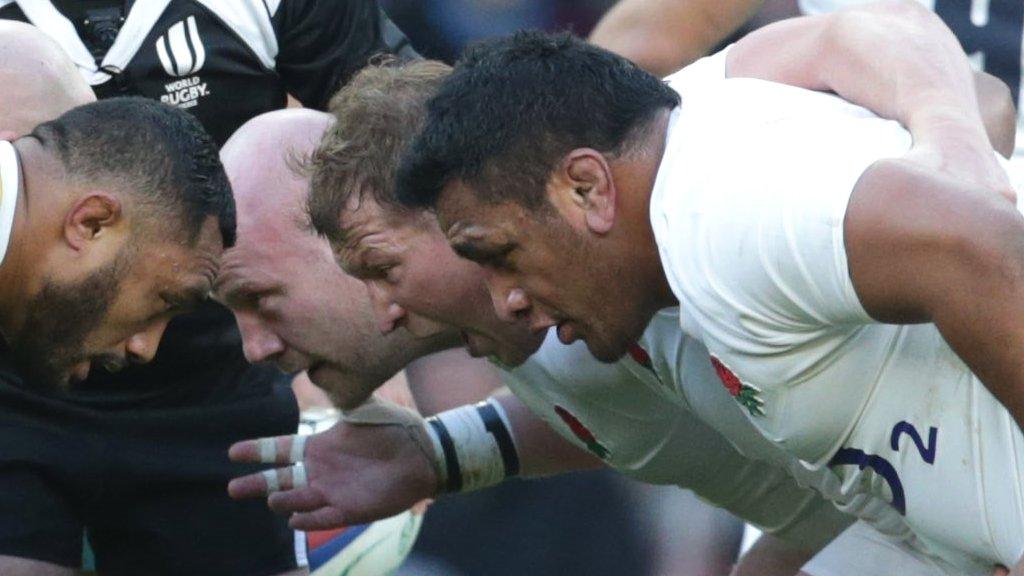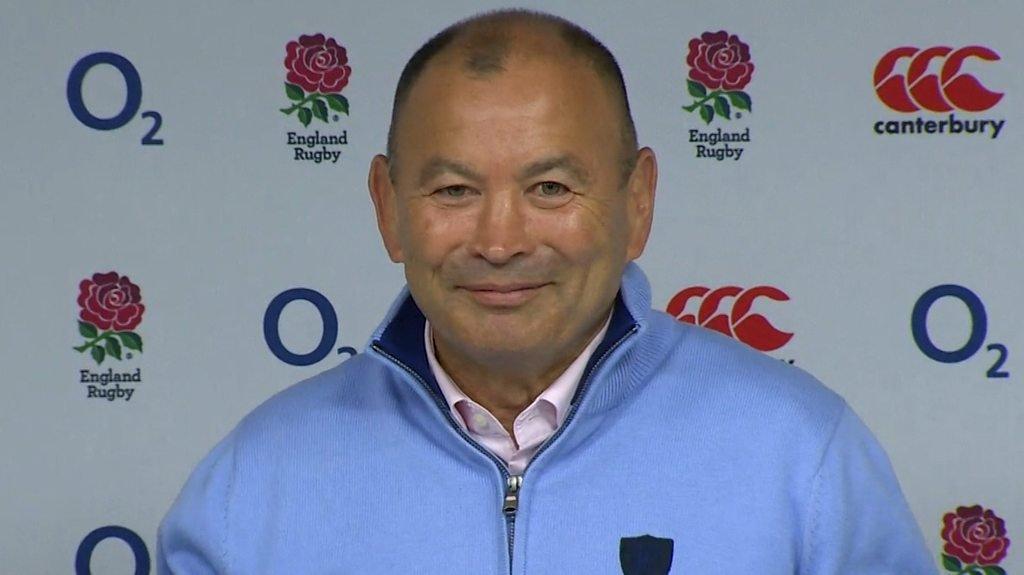Six Nations 2018: How Eddie Jones will get England to peak at World Cup
- Published
- comments
'Can't be arrogant or presumptuous' about the England job - Jones
Follow the 2018 Six Nations live on the BBC |
|---|
Dates: 3 February-17 March |
Coverage: Watch live on BBC TV, Red Button, Connected TVs, BBC Sport website and mobile app. Listen on BBC Radio 5 live, 5 live sports extra, BBC Sport website and app. Live text coverage on BBC Sport website and app. |
Two Six Nations gone, two Six Nations left until the World Cup. For Eddie Jones' England, this week marks the tipping point: the past almost unblemished success, the future still up for grabs.
Jones' record across his first two seasons would suggest a temptation to lean back on laurels. Twenty-two wins in 23 matches, the solitary blot a four-point reverse in Dublin, a city of habitual English defeat.
Except everything you hear from within the England camp is instead indicative of doubt, anxiety and constant change. Coaches can struggle to maintain initial success; just look at the recent struggles of the nation's Test cricketers after early improvement under Trevor Bayliss. And so Jones, it would appear, is in revolutionary mood.
"Eddie's not like anybody I've met before," admits winger Jonny May. "He puts you in a position where he makes or breaks you.
"He's tested me mentally and physically. He's constantly on to me about the big things, the small things, constantly demanding more.
"He can be intimidating. Sometimes he can be hard at you. He'll stop a training drill if it's not good enough. He'll completely pull the plug on it."
As with his players, so with his coaches. "His favourite question is probably, 'why?'" says Paul Gustard, assistant coach, in charge of the team's defensive work.
"He's restless. A workaholic. And curious. Underpinning all that is an overwhelming desire to win.
"We could be on a training plan that we sign off in the evening, and that could be version 15, and then the next morning we've already got two different versions, because he's slept on it and thought about it on the cross-trainer in the gym at 5.30am, and he's not happy with it."
The current fortnight might look like rather a soft entry into a Six Nations tournament that will see England play three of their five matches away from Twickenham. Last week's warm-weather training camp in Vilamoura, Portugal, is followed by an opening weekend visit to Rome, where they have never lost: 23 matches between England and Italy, 23 wins for the men in white.
Jones, however, is not a man for soft. When you are with England, when you playing for your club, when you are on the sofa at home, you are being watched, and you are being pushed.
"He's the hardest task-master I've known," says centre Jonathan Joseph. "You always have hard days in a week, but a hard day with England is right up there.
"It's a blessing and a curse at the same time. He's everywhere. He's at every game, and if he can't get to it he'll watch it on his laptop.
Six Nations: We'll be physical and brutal in Italy - Jones
"If you're not working hard enough, you'll get a good kicking. He calls and texts. When I see his name come up on my phone, I hope it's a good message. Sometimes it is, sometimes it isn't.
"He could be watching you in your club game, and after 72 minutes he'll spot you doing something he likes or dislikes, and he'll text you there and then. It might be that I've worked really hard getting back on a kick-chase - I might not even have got the ball, but if he likes the effort, he'll message you.
"You'll come into the changing room and see when he's texted you, and know that he's definitely been watching. He's pretty invincible - he lives and breathes rugby, and he knows exactly what he wants from his team and his individual players. He knows every single bit. And he loves it."
Joseph is not a young wannabe. He is one of a number who Jones will favour if fit, a group that also includes Dylan Hartley, Dan Cole, Courtney Lawes, Chris Robshaw, Billy Vunipola, Ben Youngs, George Ford, Owen Farrell, Anthony Watson, Elliot Daly and Mike Brown.
Security of tenure is supposed to be good for elite sportsmen, promoting confidence, relaxation, the freedom to take risks. Jones might be consistent in his selections, but he is also dependably unsettling.
"No-one looks comfortable to me," says Maro Itoje, another of the favoured players. "Those who appear on the team-sheet more often than not - if you speak to them you'll find that they don't feel comfortable.
"Eddie keeps everyone on their toes. It doesn't matter how old you are, how many caps you have or how few caps you have. Everyone is held accountable."
England's Six Nations fixtures | |
|---|---|
Sunday 4 February | Italy (a) |
Saturday 10 February | Wales (h) |
Saturday 24 February | Scotland (a) |
Saturday 10 March | France (a) |
Saturday 17 March | Ireland (h) |
Earlier this month the Rugby Football Union announced it had signed Jones to a two-year contract extension, meaning his tenure will now run past the next World Cup in September 2019.
It raised eyebrows because Jones has never stayed in any job for as long as six years. He will be in his 60th year when that World Cup in Japan gets under way, an age when most coaches still in employment have a preferred method they tend to stick to.
Isn't there a danger that the messages will be too familiar by then, that either players or opponents will become too accustomed to the Jones style, that the constant chivvying and irascibility will wear others out?
"We had an hour's conversation when I started, and Eddie's first question was, how can I get better?" says Neil Craig, the former Aussie Rules coach recently appointed as England's head of high performance.
"For him it's always, what's new, what's different? His first question to me down the years has inevitably been, what's new in elite sport in Australia?"
Gustard first worked alongside Jones at Saracens. The Australian's spell in north London ended early, less than two years after he had signed and after a period he has described as his worst in rugby.
It is not the only unhappy ending on his CV. He was sacked as Wallabies coach in 2005 after a run of eight defeats in nine games, and resigned as coach of Queensland Reds after they finished bottom of the Super 14 table two years later.

Eddie Jones is looking for his third consecutive Six Nations victory with England
Gustard, a loyal lieutenant then and now, believes Jones has evolved considerably through those challenges.
"The one constant is his work ethic," he says. "The biggest thing I've seen him change is that he was a very structured coach in 2008 and 2009. Now he's very destructured.
"The thing that he's probably best in the world at is that he moves with the game. He's always trying to problem-solve things that are ahead. That's what drives him. The biggest change is that he now changes day to day."
Both May and Joseph speak favourably of the effect Jones has had on them. This past fortnight the messages to the winger have been about his work under the high ball, about being more vocal in defence as he manages the back-field. Joseph has also been told to get more depth in attack, to buy more time on the ball so he can use his footwork and vision.
"You never fully know where you stand with him - but that's a good thing," says May. "He knows how to build you up as well. You want to play for him and the team."
The next two years will define Jones as England coach even more than the previous two. Should the World Cup not deliver the dividend the RFU hopes for, there is a break clause that would jettison the two years after that too.
And so his players, and coaches, will have to keep dealing with the early starts, and the late finishes, and the constant nagging fear of being watched and assessed, wherever they are.
"Of course people get tired, but we have fallow weeks in the Six Nations, and you have to find that time to re-energise yourself, to make sure that you bring the enthusiasm you had on day one," says Gustard.
"These are hours we want to work. I could have said no to England. I could walk away now. But I don't want to.
"I want to learn and get better, and I believe under Eddie I'll get a lot better, and so the team will get better, and we'll start winning things on a regular basis."
- Published27 January 2018

- Published26 January 2018

- Published18 January 2018
